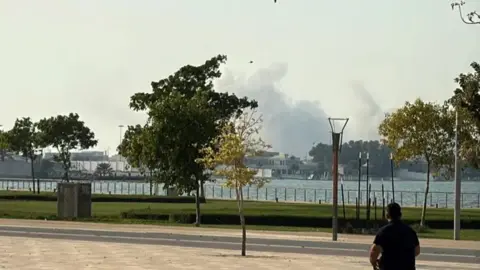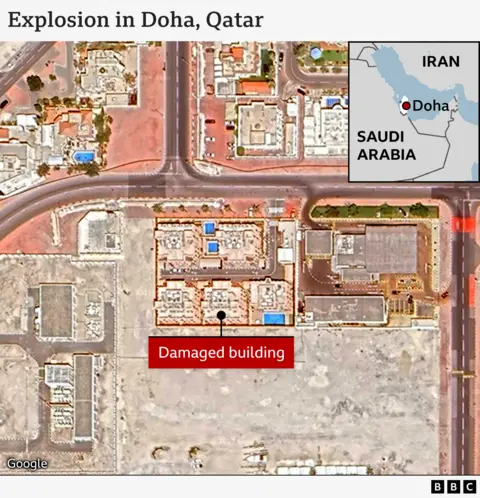What do we know about Israeli strike on Hamas in Qatar?
2 hours agoFiona Nimoni

 Reuters
ReutersIsrael carried out a strike on senior Hamas leaders in Qatar’s capital, Doha, on Tuesday afternoon.
Qatar quickly accused Israel of “reckless” behaviour and breaking international law after the attack on a residential premises in the city.
The Israel Defense Forces claimed to have targeted those “directly responsible for the brutal October 7 massacre”.
Here is what we know so far.
How and where was attack carried out?
Explosions were heard and smoke was seen rising above the Qatari capital Doha early on Tuesday afternoon.
Verified footage showed smoke rising from a heavily damaged section of a complex next to Woqod petrol station on Wadi Rawdan Street, close to the West Bay Lagoon district north of central Doha.
According to the Israeli military, it conducted a “precise strike” targeted at Hamas senior leaders in Qatar using “precise munitions”.
Israeli media says the operation involved 15 Israeli fighter jets, firing 10 munitions against a single target.
Qatar has hosted Hamas’s political bureau since 2012 and played a key role in facilitating indirect negotiations between the group and Israel since the 7 October attacks.


Who was hit in the attack?
Hamas said members of the group’s negotiating delegation in Doha had been targeted but survived the strike. However Hamas said six others, including a Qatari security official, had been killed.
According to Hamas, those killed were:
- Humam Al-Hayya (Abu Yahya) – son of chief negotiator al-Hayya
- Jihad Labad (Abu Bilal) – director of al-Hayya’s office
- Abdullah Abdul Wahid (Abu Khalil)
- Moamen Hassouna (Abu Omar)
- Ahmed Al-Mamluk (Abu Malik)
- Corporal Badr Saad Mohammed Al-Humaidi – Qatari internal security forces
“We confirm the enemy’s failure to assassinate our brothers in the negotiating delegation,” a Hamas statement said.
It added the strike “confirms beyond doubt that Netanyahu and his government do not want to reach any agreement” for peace.
Earlier in a post on X, Israel’s President Isaac Herzog says it was “important and correct” to target Hamas’s leadership, and then condemned Khalil al-Hayya – Hamas’s chief negotiator and exiled Gaza leader – without confirming he was a direct target.
A senior Israeli official told Israeli media that al-Hayya was one of those targeted, as well as Zaher Jabarin, the exiled West Bank leader.
What did the US know and did Trump give a ‘green light’?
The office for Israeli Prime Minister Benjamin Netanyahu put out a statement shortly after the strike, claiming the attack was “a wholly independent Israeli operation”.
“Israel initiated it, Israel conducted it, and Israel takes full responsibility,” it said in a statement.
The White House also quickly confirmed it was informed of the operation, almost certainly because of the proximity of the huge US airbase at al-Udeid, just outside Doha.
This means that Donald Trump had a chance to say no to Israel but chose to give a green light instead.
Given this was an attack on sovereign Qatari territory, questions remain over how this will affect the massive US airbase at al-Udeid and how it will affect US relations with all its Gulf Arab allies.
What were Hamas leaders doing in Qatar?
Qatar has acted as a mediator between Israel and Hamas and has hosted negotiations between them since October 2023.
A couple of days ago, Hamas said it welcomed “some ideas” from the US about how to reach a Gaza ceasefire agreement that it received through mediators. It said it was in discussion about how to turn them “into a comprehensive agreement that meets the needs of our people”.
It’s thought likely the targeted Hamas leaders were in the middle of discussing their formal response to the US ideas.
A Palestinian official earlier told the BBC the US plan would see the 48 remaining hostages in Gaza freed in the first 48 hours of a 60-day truce in exchange for Palestinian prisoners in Israeli jails and good-faith negotiations on a permanent ceasefire.
How has Qatar reacted?
In Doha, the Qatari government reacted with fury, calling the attack reckless and cowardly, and a blatant violation of all international laws and norms.
“While the State of Qatar strongly condemns this assault, it confirms that it will not tolerate this reckless Israeli behaviour and the ongoing disruption of regional security, nor any act that targets its security and sovereignty,” a statement from its foreign ministry said.
Similar statements of outrage came from across the Arab world.
UN Secretary General Antonio Guterres also condemned “this flagrant violation of the sovereignty and territorial integrity of Qatar”.